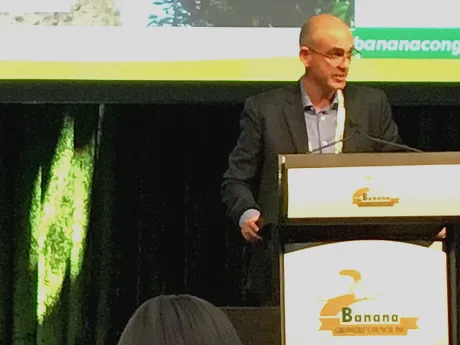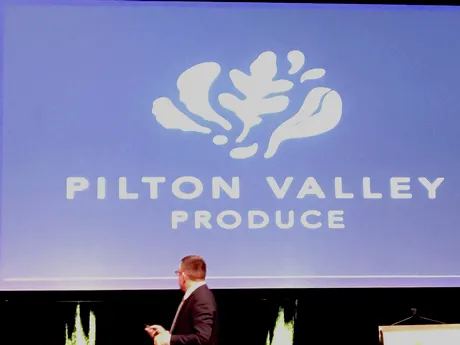Fresh produce businesses need to be aware of change and embrace it, or it will happen without them with devastating consequences, according to one of Australia's leading produce company managers.
Austchilli's Innovation, Marketing and Sales General Manager Rob Pafumi spoke at the Australian Banana Industry Congress, sharing his insights of how he has been able to adapt and thrive in the evolving global market. He grew up in the Burdekin, in North Queensland, with his parents’ small crop vegetable farm and says has seen a lot of change in his 32 years in the industry, including many businesses dying out because they could not adapt.
"Change is all around us, in every sector - and as obvious as it sounds; unless we embrace change, change will happen to our business and change will happen without us," Mr Pafumi said. "But the biggest point I want to make is innovation and change, in my opinion, are not necessarily the same thing; you can have the most innovative product, plant variety or system out there, but unless you install change right across your organisation - that variety may not see the light of day. Many don't."
He referred to examples such as Kodak, Blockbuster and Sony, which he says all suffered the consequences of lacking vision and not keeping up with the world's changing market dynamics. Mr Pafumi added the fresh produce sector is not immune, and there is so much change happening, that businesses need to act quickly or disappear.
"A customer once told me: you must change to remain relevant and you must change to grow your business," he said. "The retail sector is changing constantly; it's becoming increasingly more competitive and diversified. Then there's the not so new formats online, such as Alibaba and Amazon, or closer to home HelloFresh, Lite N' Easy, Youfoodz, which have changed the way in which people shop. They are all growing at an incredible rate. What changes have they forced upon your businesses?"

Mr Pafumi shared some of the changes Austchilli has made since it was formed in the 1990s from a farming organisation focusing on fresh chilli. While the market was solid, he says it was hard to get growth, but realised that their customers and the market was both changing.
"These changes became our visions, these visions turned into opportunities, these opportunities provide us with business growth," he said. "We asked ourselves how can we build a business that will enable us to grow and supply fresh chillies 52 weeks a year nationally. We wanted to be the number one supplier of fresh chilli to the retail market. With that vision we changed; we invested in people, we developed farming practices that enabled us to streamline operations. We lived and breathed the process. We are now able to supply fresh chilli 365 days a year in every state."
Next came the puree side of business, which was established to minimise risk, if the fresh market suddenly changed. Mr Pafumi says the two not only complimented each other, but built up the company's capabilities, and now Austchilli exports chilli and pureed vegetables to 12 countries around the world. Then came their Avocado product "AvoFresh", which made the product more 'convenient' as consumer demand grew.
"We saw the change, but instead of the market changing us, we changed the market," Mr Pafumi said. "However, it is not always plain sailing. Every one of these opportunities could have failed many times over. Ultimately, it was our ability to see that change provided us the opportunity to succeed. Every problem that we had made us stronger and lay the platform for the next opportunity."

Change pays off in many ways for a rapidly growing salad company
Salad and vegetable company Pilton Valley Produce is 10 years old, and began in the form that operates today through the need for change. After losing some water allocation, the Dewar family farm had to find a new use, as it was no longer sustainable. In consultation with an agronomist, it was determined that lettuce would be a good crop to grow.
"We put in a trial in August 2009," Managing Director Andrew Dewar said. "That went pretty well and we grew 25,000 plants a week, which was a massive program, and we did that for about 20 weeks. We did the numbers after that season and decided to 'supercharge' it. We borrowed money from the bank and developed the farm by putting in all the things that was the keys to have a successful horticulture business; coolrooms and automated irrigation. All the infrastructure needed for a successful business."
But in 2011, southern Queensland was hit with a major flood, and the property in the Darling Downs region was inundated with three metres of water, and the company had just hit peak production by three weeks, so: "the maximum amount was outstanding, and the minimum was coming in". Mr Dewar and his brother did not give up, instead investing more thanks to an even greater loan, believing they could make it work.
"We had to really think, how we could turn this around and make it work," he said. "After the floods, we wanted to be the first people back in. So, seven days after the floods, we had four huge tractors in the field getting everything right. We were back in production in eight weeks - no-one else was. That actually gave us an advantage on our competitors. By making the change and getting back into the market."

From there, Pilton Valley Produce went from strength to strength, albeit with a few bumps along the way. From an initial crop of 25,000 plants, the company now does 1.8 million plants at the height of production in summer, and has produce exported to seven countries. The Dewar's are fifth generation farmers, and it has not just been physical changes to the business over the years, but also to the management structure.
"It is pretty fair to say we have some strong personalities, and while we were happy with our business growth, it was to the point where we weren't getting on as a family," Mr Dewar said. "By this time, I had embarked on my Nuffield Scholarship, and I had seen what some of the big companies in the United States had done family structure wise, and a lot of them had gone to a corporate-like structure. So, in 2015 we implemented a family board to make everyone accountable for what they did. It is the best thing we have done. We have an awesome family relationship, because work and family matters have been separated."
Mr Dewar stressed that it was important for businesses to drive change, and taking control of the stories and messages that they want to share with consumers.
"Pressure and change are a good thing; you have to embrace it because at the end of the day, it is the way forward," he said. "Our business is one that embraces change, so much so that we love it and thrive on it. I believe that farming is going through a 'purple patch' in Australia at the moment; we are at an opportune time to really take advantage. We shouldn't sit on our haunches; we should drive it further. We need to educate communities and drive change. Be thinking about what is the story of your business, and what do you want people to know? Go out and tell them that."
